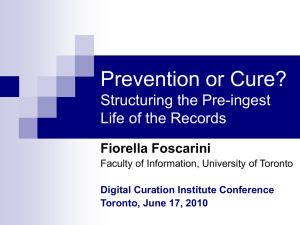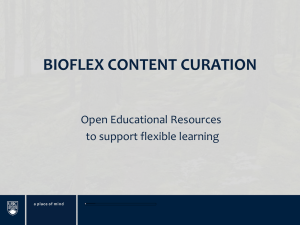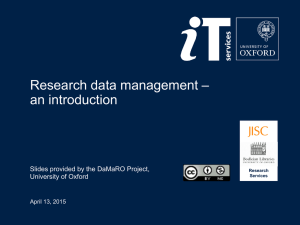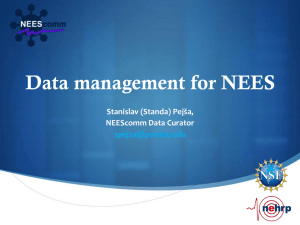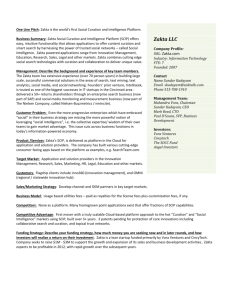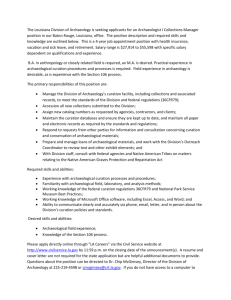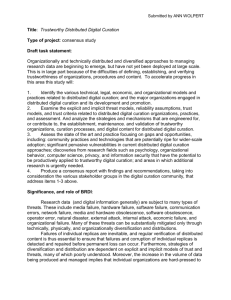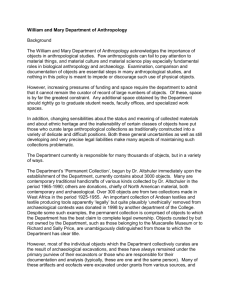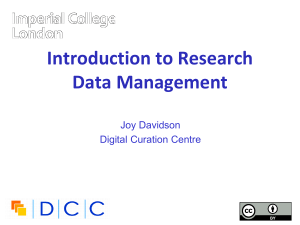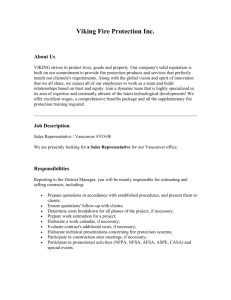presentation - The Digital Curation Institute
advertisement
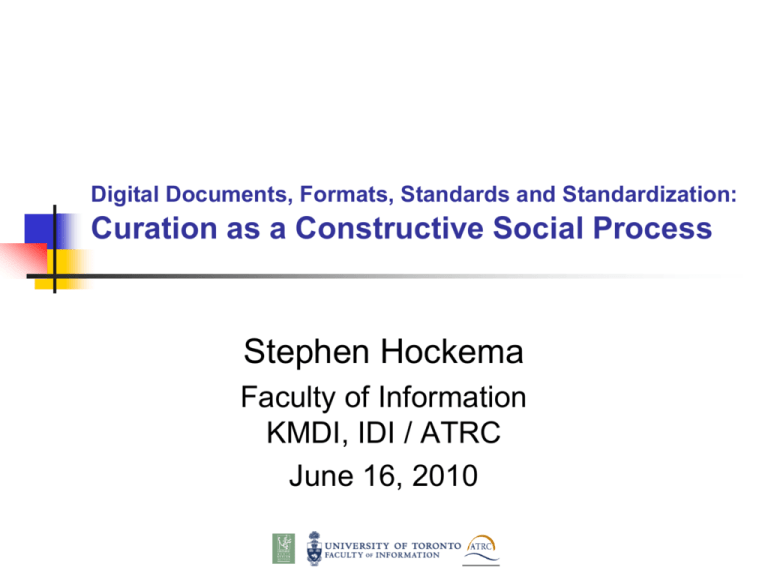
Digital Documents, Formats, Standards and Standardization:
Curation as a Constructive Social Process
Stephen Hockema
Faculty of Information
KMDI, IDI / ATRC
June 16, 2010
Overview
What am I doing here?
Digitality!
Digital Curation
Digital Preservation
Digital Repositories
Digital Archives
Digital Humanities
Digital Mediation
Digital Texts
Digital Books
Digital Art
Digital …
Curatorship
Content Specialization, Organization and
Interpretation
Exhibition, Display and Publication
Digital Curatorship
Content Specialization, Organization and
Interpretation
Exhibition, Display and Publication
Digital curation is the selection, preservation,
maintenance, and collection and archiving of
digital assets. -- Wikipedia
Includes acquisition, documentation and care
Digital Curatorship
Content Specialization, Organization and
Interpretation
Exhibition, Display and Publication
Digital curation is the selection, preservation,
maintenance, and collection and archiving of
digital assets. -- Wikipedia
Includes acquisition, documentation and care
“Guardianship” (Curators as Caretakers)
Tie-ins
Who is the digital curator?
When is digital curation?
Where does it happen?
What is being curated?
(digital “objects”?)
Why?
Curation is about authority, access
and participation too.
Digital Documents
As objects / processes / contexts / a
form of sociality and work
Formats (via standardization in
conjunction with tools) “determine” what
documents are.
…and Metadata, and Record, …
…and associated Processes, Work Flows.
Some motivations
Standards vs. Formats vs. Applications
Applications
(Default) File Format Standard
Microsoft Word
*.docx, *.doc
OOXML(ISO)
Microsoft Excel
*.xlsx, *.xls
OOXML (ISO)
Microsoft PowerPoint *.pptx, *.ppt
OOXML (ISO)
Adobe Acrobat
*.pdf
PDF (ISO)
OpenOffice
*.odt
ODF (ISO)
DreamWeaver, IE,
Firefox, Safari, etc.
*.html, *.css
(X)HTML + … (W3C)
TextEdit, etc.
*.rtf
Edit, vim, emacs, etc. *.txt
(</oxYgen>), …
*.xml
XML (ISO)
iAnnotate PDF
iAnnotate
Designing tool and workflows and
processes simultaneously
Constrained by formats and standards
And Infrastructure(s).
(and Apple!)
Some Issues
Conformance, Flexibility, What is
“legal”(supported, optimized for, …)
Genre
What is metadata (vs. document)
“Mark Up” ?
Document Identity (synchronization)
Versioning (“discreteness”)
Stability
Some Issues
“Addressing” and Attachment Points
(Digital) Rights Management
Affordances of Documents
Representation and Storage
Digital / Material Interfaces
“Where the Document Ends!”
Not just about the Web!
And yes, Archiving and Curating
“My” Archiving Issues
Archiving to do what later?
Authenticity and Context
Rethinking storage vs. “in use” distinction
Notion of Stability
Notion of Medium vs. Format
“Paperless!”
Document Formats
PDF Standard (ISO/IEC 32000-1:2008)
OOXML (ISO/IEC 29500:2008)
Over 6000 pages
Roots in .doc, .ppt, .xls.
ODF (ISO/IEC 26300:2006)
Current version (of six): 1310 page PDF (~50 fonts!)
Roots in postscript.
Roots in OpenOffice.org and Sun
{X}HTML
Document Formats
(Lexel)
Vancouver: A Digitally “Open” City
(In May of 2009, after a bunch of WHEREAS clauses…)
THEREFORE BE IT RESOLVED THAT the City of Vancouver
endorses the principles of:
Open and Accessible Data - the City of Vancouver will freely
share with citizens, businesses and other jurisdictions the
greatest amount of data possible while respecting privacy and
security concerns;
Open Standards - the City of Vancouver will move as quickly as
possible to adopt prevailing open standards for data,
documents, maps, and other formats of media;
Open Source Software - the City of Vancouver, when replacing
existing software or considering new applications, will place
open source software on an equal footing with commercial
systems during procurement cycles; and …
Vancouver: A Digitally “Open” City
BE IT FURTHER RESOLVED THAT in pursuit of open data the
City of Vancouver will:
Identify immediate opportunities to distribute more of its data;
Index, publish and syndicate its data to the internet using
prevailing open standards, interfaces and formats;
Develop appropriate agreements to share its data with the
Integrated Cadastral Information Society (ICIS) and encourage
the ICIS to in turn share its data with the public at large
Vancouver: A Digitally “Open” City
Develop a plan to digitize and freely distribute suitable archival
data to the public;
Ensure that data supplied to the City by third parties
(developers, contractors, consultants) are unlicensed, in a
prevailing open standard format, and not copyrighted except if
otherwise prevented by legal considerations;
License any software applications developed by the City of
Vancouver such that they may be used by other municipalities,
businesses, and the public without restriction
BE IT FINALLY RESOLVED THAT the City Manager be tasked
with developing an action plan for implementation of the above.
Infrastructure for Openess
This is also Digital Curation!
Enables things like (DataMob)
Participation
Infrastructure for Openess
Need for Inclusive Design / Accessibility
Not just “future” accessibility
Participation / Access loop
Case study / Example from OOXML
OOXML (In)Accessibility
No consultation with disabilities groups,
assistive technology developers /
vendors, accessibility community, etc.
Relative change rates and stabilities
Contingencies (lock in)
Curation as Inclusive Design
Integrate {preservation} into workflow,
yes, but workflow can be “designed”
…via the Standardization process, e.g.
So not just about “sheer curation at the
source” or “digital preservation”.
Curation as a social design challenge.
Ethics of Digital Curation
DCI training for participation in
standardization processes for:
Formats
Metadata
Best Practices
Support from professional societies.
Curation as Design
Beyond:
Repositories and Preservation
Users as Curators
Subject / Object divide
Meta-curation?
No. Digital curation!
Questions, Comments?
steve.hockema@utoronto.ca
